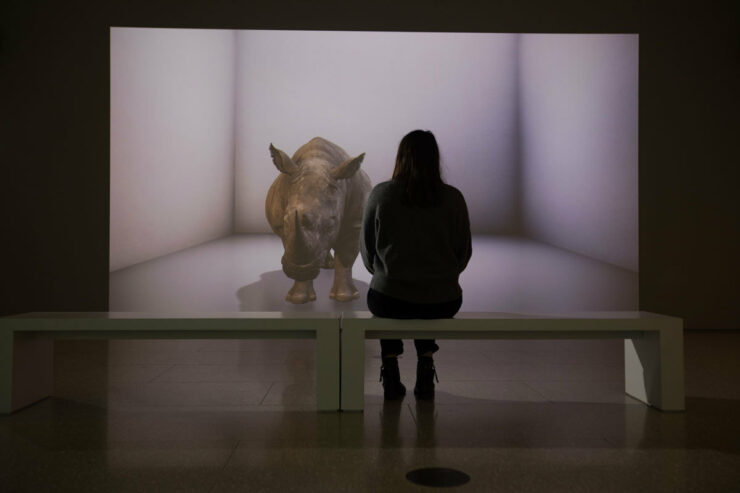News
Call for Participants: Workshop IV: Exhibition – Curation – Decolonization
Reading Zoos in the Age of the Anthropocene
Workshop 4: Exhibition – Curation – Decolonization
10–12 November, 2021
Utrecht University, Netherlands
[Online via Zoom]

The substitute by Alexandra Ginsberg. Photo credit: Royal Academy of Arts, London / David Parry
In the context of my research project, “Reading Zoos in the Age of the Anthropocene”, funded by the Dutch Research Council (NWO), I invite scholars, including advanced PhD students and early-career academics, as well as artists, writers, and zoo professionals, to participate in the fourth workshop in a continuing series devoted to the place and significance of the zoo in the contemporary context of anthropogenic climate change and mass extinction.
Each workshop in the series focuses on a different issue or theme relating to the past, present, and future of the zoo as a more-than-human space of the imagination. In the first workshop, “World – War – Zoo” (April 2019) we explored the role of the zoo as a site of memory and how the recent preponderance of images of zoos in wartime serves as an analogue for (or distraction from) the ongoing devastation of the natural world. In the second workshop, “Captivity – Captivation – Observation” (Nov. 2019) we turned our attention to the lived experience of zoo animals and the real or imagined transgression of boundaries separating them from the human spectator. In the third workshop (Oct. 2020), entitled “Extinction – Conservation – Resurrection?”, we explored the recurring trope of animal disappearance and the sense of mourning and melancholia that pervades the discourses on the zoo and the Anthropocene and asked how literature, film, and other artforms can help us to imagine alternative multispecies futures.
The fourth workshop, to be held online on 10–12 November 2021, will be entitled “Exhibition – Curation – Decolonization.” We will expand the focus of our inquiry and consider the interrelationship between the zoological garden and the natural history museum as twin institutions of the Anthropocene. The establishment of these institutions coincides with the Industrial Revolution and the height of Western Imperialism, which in turn is tied to the human transformation of the planet now culminating in catastrophic climate change and loss of biodiversity. Thus, the history of the Anthropocene is written in the history of these institutions, a fact which many zoos and museums are increasingly beginning to acknowledge and thematize. How are zoos and museums telling that story and reflecting on their own implication in it? And what role can literature, art, and culture play in reading and writing the zoo and the natural history museum “otherwise” so as not simply to repeat or endorse the established, monolithic Anthropocene narrative of Man? What alternative (hi)stories of the Anthropocene and its institutions are there, and where and how are they being told? How are artists, writers, curators, and others reimagining these spaces from a feminist, decolonial, and non-anthropocentric way? These are just some of the questions we would like to explore in this workshop.
You do not need to have attended the first three workshops to participate. Like in the previous workshops, we will follow a “show-and-tell” procedure, meaning that rather than presenting papers, participants present an object of some sort and lead a discussion on it. A workshop reader will be distributed to all participants in advance.
There are three ways you can take part: 1) you can present your own ongoing work on zoos and/or natural history museums, in which case you should provide a short essay or draft (no more than 15–20 double-spaced pages) to be included in the reader; 2) you can offer to lead a discussion on a particular text, image, video, piece of music, archival document, material object, etc., of which you are not the author but which you consider to be important and relevant to the topic, and which can likewise be circulated in advance; or 3) you can simply attend the workshop and participate in the discussion without presenting. (When putting together the programme, I aim to have a good balance between Option 1 and Option 2, with a slight preference for Option 2.)
If you would like to take part please send a short bio and description of your current or recent research and/or practice relating to the figure of the zoo, as well as suggested readings/materials (in the case of Options 1 or 2) to: Kári Driscoll (k.driscoll@uu.nl) by the 30th of September, 2021. In light of the prevailing pandemic, and in order to make it possible for as many to participate as possible, the workshop will be held entirely on Zoom over three days.

